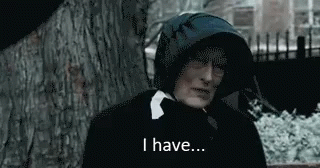At their next confrontation, Flynn tells Aloysius she has nothing more than unfounded suspicions, telling her that certainty is not truth, and she tells him that she has investigated his past and that she talked to a nun about his departure from his previous parishes. Flynn insists on his innocence but is angry and says Aloysius broke the chain of command. He threatens to remove her from the parish and confronts her about meeting with Donald’s mother. Aloysius demands Flynn ask for a transfer and take a leave of absence and that no more harm will come to Donald, clearly blackmailing him. That Sunday, Flynn delivers his farewell sermon, Donald Miller sheds a tear.
A few weeks later, Flynn is gone, Aloysius says she is sure she did the right thing, while Sr. James is deeply troubled. Aloysius was disciplined for breaking the chain of command, and Father Flynn was promoted to a larger and more prestigious church. Aloysius admits to James she lied and that she never called a nun, but the lie would not have worked if Flynn had been innocent, and that his resignation from this church amounted to a confession, but Sister James says that she cannot believe she lied, and Aloysius repeats that “In the pursuit of wrongdoing, one steps away from God. Of course, there is a price.” Suddenly, Aloysius breaks down and cries. She admits that she has doubts, “such doubts”

Many of the questions surrounding Sister Aloysius’ alignment or lack thereof with Kantian ethics revolve around her motivation, despite her apparent emphasis on moral duty, (although it more closely resembles divine command theory). Is she using Donald’s case as a way to remove Father Flynn, who she dislikes and is a threat to her power, on many levels, not least of which being he is well liked and respected by all, in contrast to her reputation?
If so, is she doing so consciously or unconsciously? If she is not, and her sense of duty is genuine, in many ways, other than her several lies, blackmailing and threats she aligns very well with many of Kantian ethics general values and principles, including a sense of duty and the idea that certain actions are universally wrong, at least in theory, yet does not apply it to herself, which may be a point in favor of formulation one. Her execution is muddied and mediocre at best. Like most of the details around this case, it is difficult to make a concrete determination about the nature of her response, and how well it aligns, or deviates with from the viewpoint of Kantian ethics, and what this says about her response because although she spends much of the film defending her viewpoints, it is difficult to know how honest she is being about her motivations, which remain opaque.
To properly evaluate Sister Aloysius under care ethics, because of the distinct nature of care ethics as a system, one must consider that none of Sister Aloysius’ actions in and of themselves count as deviations, but her relationship to Donald primarily. We will talk more about this next week.
 Link source
Link source
I like how deep of an analysis you’re doing for this movie! I think it’s helpful how much context you provide about the plot and characters, especially as someone who has never seen or heard of this movie. I also think it’s interesting how you relate specific characters’ actions back to theories rather than just overarching plot elements. Overall, this is an interesting post, and I’m looking forward to reading the next one!
Whether she is using Donald’s case to remove Father Flynn or not, she evidently dislikes him and deems him a threat to her power, likely meaning she would have tried to have him removed anyway. Perhaps part of her truly believes she is saving Donald by doing this all at once, albeit that it works out a little differently than she had planned. Reputation aside, it seems that she believes him to be a sinful man and he is only well liked, respected, and rewarded for it. It makes sense that she would be angry and would like him gone.
I watched “Doubt” in my AP English class senior year and found your blog topic interesting. So many moments throughout the book and movie require deeper analysis to be fully understood. I love your examination of Sister Aloysius’ actions regarding Father Flynn, as it’s clear from the beginning that she disliked him before he grew close to Donald. The discussion of whether Sister Aloysius was driven by bias toward Father Flynn or out of care and protection for her students. I’m excited to read the rest of your blog posts that cover “Doubt” great job so far!
Hey Mitchell! your post was very intriguing and I definitely have to read your past posts to understand this recent one more fully. The emphasis and details your express throughout your post really engaged me into your post and honestly I can’t wait to see what happens next. I definitely think sister Aloysius had some malicious intentions when she lied and she seems to be a bit of a hypocrite with implying things to others but herself. Maybe she’s not my favorite character, good work!
This sounds like a really cool show and I find it really interesting how you broke it down. I went to a Catholic high school, so I remember learning about Kantian Ethics, but I have forgotten almost all of it. However, it was cool to see you mention it again!